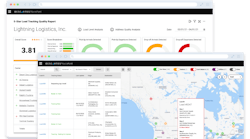Generally speaking, when it comes to my personal auto liability coverage, I normally write a check every six months for coverage and forget about it until it comes time to write another check for the next six months of coverage. As painless as it is to write those checks, I can only imagine what it would be like if I owned a truck fleet that said “Heller Trucking” on the side of the trailer. As everyone knows, liability coverage for motor carriers and drivers of commercial motor vehicles has come under a lot of scrutiny since MAP-21 was signed into law. So much scrutiny that several professional organizations have gone so far as to say that the trucking industry is under-insured and the minimum liability levels should be increased. One bill recently proposed in the House of Representatives would raise the minimum liability coverage to a whopping $4.422 million, a huge jump from the current level of $750,000.
TCA policy regarding minimum levels of insurance does support an adequate level of liability coverage to protect the public at reasonable minimum limit levels. The recent availability of data suggests that less than 1% of all settlements regarding accidents are for more than the minimum threshold. Does that mean that we as an industry should be upping that minimum liability coverage? No, it speaks to the fact that the coverage that currently exists is adequate enough to protect the public.
Speaking of protecting the public, one organization has even gone so far as to say that in order to make trucks safer, the minimum level of coverage needs to be raised. When reading the fine print, however, the organization proposing this is comprised of plaintiff’s attorneys who make their living by filing claims against trucking companies. That being said, it is easy enough to assume that these people want the minimum levels raised so they can reap higher rewards.
It seems fairly obvious to me that, after 15-plus years in trucking, we as an industry have reached a point where we are now operating safer than we ever have been. The advent of CSA has placed truck safety on the front burner of every person employed by a trucking company. Think about it, 1 out of every 15 workers in this country is employed in trucking. One out of 15 workers in this country thinks about the safety performance of trucks every day in their lives, mainly because of the nature of our industry.
This industry is reaching never before seen levels of safety—and we continue to advocate for more. Electronic logging devices, a drug and alcohol clearinghouse, and a speed limiter mandate are just a few avenues in which we continue to support an improvement in safety and clamor for sensible mandates that would make every carrier in our industry safer.
Next time you see an item that is proposing a monumental increase to your minimal liability coverage stating the industry would be safer because of it, take solace in knowing that the efforts you and your staff put into place on a daily basis in the name of safety are paying more dividends than any increase in liability coverage ever could.


